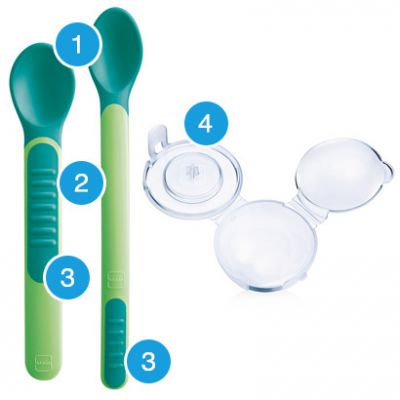Feeding Spoons & Cover - Baby's Cutlery
Heat sensitive tips – change colour if food is too hot
2 steps to independent eating
1st step:
- Long spoon easily reaches the bottom of deeper glasses
- Parents and babies can hold the spoon together
2nd step:
- Short, broad spoon – designed for baby’s small hands
- Ideal for holding on their own

![]()
1. HEAT SENSITIVE TIPS
Change colour if food is too hot / soft and gentle on palate and gums.
2. INNOVATION
2 steps to independent eating with a spoon:
Step 1: Long spoon: easily reaches the bottom of deeper Jars; allows you to hold the spoon together.
Step 2: Short, broad spoon: designed for baby’s small hands – ideal for holding on their own.
3. EASY TO USE
Non-slip surfaces: secure and easy for babies and parents to hold.
4. INNOVATION
Compact and spacesaving! Two compartments keep clean and used spoons hygienically separated.
All MAM products are made from materials free of BPA and BPS
For babies from 6 months
DEVELOPED WITH MEDICAL EXPERTS:
HONORED WITH THE EU PRODUCT SAFETY AWARD 2019
Bisphenol A (BPA) is an important component for the manufacturing of polycarbonate (PC), whereas Bisphenol S (BPS) is an organic chemical used to make polysulfone. Among other items, food packaging, plastic utensils and baby bottles are just a few examples of products made with PC, whereas the main usage of BPS is in thermal papers and inks. The problem: Trace amounts of chemical substances gradually leach out of the plastic into the food and might eventually get into the body. This can affect small children and infants in particular.
As a result of exposure to BPA, experts and studies have seen disruptions to the hormone system and brain, diabetes and heart damage as well as an increased risk of cancer. Although scientific evidence is not yet conclusive, the European Commission - based on the precautionary principle - has banned the usage of BPA in baby bottles in order to protect the health and safety of babies and small children.